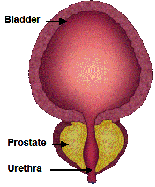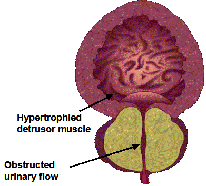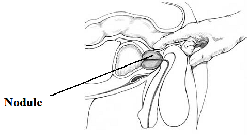
Enlarging prostate, causing obstuction to urethra

Normal prostate
Enlarged prostate or BPH
Digital rectal examination
for prostate problems
Does BPH occur in all men ?
BPH is the commonest benign tumour in men. It is found in 50% of men at 50 years old and can be as common as 90% in men at 90 years of age. However, enlargement of the prostate may not be associated with symptoms or complications.
Benign Prostatic Hyperplasia (BPH)
Non-cancerous prostate enlargement or BPH refers to the increase in size of the prostate gland in middle-aged and elderly men. Enlargement of the prostate is part and parcel of the aging process and usually occurs at 50 years onwards. BPH causes urinary symptoms by causing obstruction to the bladder outlet due to the enlarged prostate gland.
How do I know if I have BPH ?
As the prostate enlargement progresses, the urethra is squeezed on more tightly and hence the bladder cannot empty completely. Hence, the one or more of the following symptoms maybe observed:
- A sense of incomplete bladder emptying
- Difficulty in starting urination
- Interruption of the stream ('stopping' and 'starting' effect)
- Frequent urination
- Urgency (sensation of wanting to pass urine very frequently)
- Waking up frequently at night to urinate (more than 2 times per night)
Symptoms of BPH should not be ignored or brushed-off as part of aging as it would lead to serious complications. Some of the common complications of untreated BPH are urinary tract infections, bladder stone formation, irreversible bladder damage and kidney failure.
When do I need to see a doctor ?
You may need to consult your family doctor or a urologist if you have any of the above mentioned symptoms. The doctor will take a detailed history, perform a physical examination of the abdomen and a digital rectal examination of the prostate. A digital rectal examination involves placing a finger in the rectum to assess the size and nature of the prostate enlargement (lumps or nodules).
Urinary stones
Kidney infections
Bladder infections
Bladder cancer
Erectile dysfunction
Urinary incontinence
Prostate cancer
Kidney cancer
Common urology conditions:

What tests would my urologist do?
Updated 19 Sep 09


Prostate



The urologist would do urine tests to exclude infection, blood and protein in urine. He will also be doing a blood test called PSA (prostate
specific antigen). PSA is a cancer marker for cancer of the prostate. An elevated PSA value requires further evaluation as it may
indicate the presence of prostate cancer in 25% of patients. However, elevated PSA may also be due to inflammation in the prostate,
infection or simply an aging prostate.
The urologist will proceed to perform a transrectal ultrasound and biopsy of the prostate to
obtain a sample of prostate tissue which is analyzed in the laboratory for cancer.
In addition, the urologist will perform an
uroflow and bladder scan study to determine objectively the severity of prostate enlargement and obstruction. A much enlarged prostate
will result in poor urine flow and large amount of retained urine at the end of normal passage of urine.
S H HO UROLOGY AND LAPAROSCOPY CENTRE









